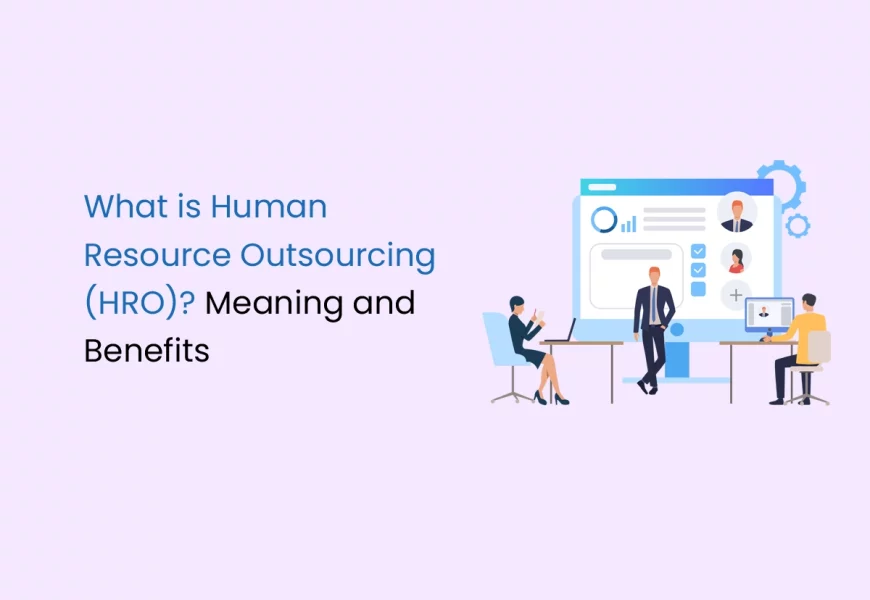The market is super competitive, and the economy is cutthroat. All of this makes businesses run cost-effectively. One such practice is Human Resource Outsourcing. Human Resources is one of the more difficult departments in any organisation to keep up with. This makes Human Resource Outsourcing an important process as it frees the professionals to focus on work that requires more human intervention.
This article will tell you all you need to know about Human Resource Outsourcing: what it is, how it works, its pros and cons, and much more.
What is Human Resource Outsourcing (HRO)?
Human resource outsourcing (HRO) involves hiring an external company to manage some or all of a business’s HR tasks. Instead of handling processes like recruitment, payroll, and employee benefits internally, a company partners with a provider that specialises in HR services. This allows the external provider to take over key functions, enabling the company to focus on its core activities. It’s like having a team of HR experts outside the business, assisting with essential tasks such as hiring, training, and ensuring compliance with labour laws.
Human Resource Outsourcing (HRO) is widely adopted across industries and can help companies save time, reduce costs, and streamline their operations, all while ensuring their HR requirements are managed efficiently. Companies can focus on strategic matters that influence corporate performance and add shareholder value by outsourcing day-to-day tasks such as payroll management, staff training, and employee benefits to experts.
This approach is particularly beneficial for businesses looking to optimise their resources. The following sections explore which HR functions are most suitable for outsourcing, the benefits this brings to companies, and the different types of HRO, such as PEOs (Professional Employer Organisations), BPOs (Business Process Outsourcing), and ASPs (Application Service Providers). This will help you assess whether outsourcing HR functions could be a practical solution for the growth of your small business.
Functions of Human Resource Outsourcing (HRO)?
Here are the seven most commonly outsourced human resources (HR) functions:
1. Administration
HR professionals are often tasked with managing a wide array of administrative duties, from developing policies to overseeing employee growth and development. Outsourcing these functions can make a substantial difference, enabling HR teams to concentrate on more strategic initiatives rather than being bogged down by day-to-day admin work. Entrusting these tasks to external experts lets companies streamline operations and free up valuable time for HR departments to focus on long-term objectives.
2. Payroll Management
Payroll can be a complex and detail-oriented process involving everything from tax filing and automated deductions to precise time tracking. Mistakes in this area can lead to legal complications, so many businesses choose to outsource payroll management to ensure accuracy and compliance. Companies can reduce the risks of errors, avoid fines, and guarantee that employees are paid correctly and on time.
3. Compliance and Risk Management
Staying compliant with ever-changing industry regulations and legal requirements can be overwhelming. Outsourcing compliance and risk management functions ensures that companies have access to the latest expertise in the field. Dedicated HR experts are well-versed in the most current regulations, codes of ethics, and legal frameworks. They can manage key documents, such as employee handbooks, and ensure that HR practices align with regulatory requirements. Outsourcing this function allows businesses to manage compliance risks and avoid potential legal disputes proactively.
4. Recruitment Services
The process of recruiting and acquiring talent is a vital HR function, but it can also be time-consuming and resource-intensive. Outsourcing recruitment allows companies to tap into extensive databases and well-established processes for finding top talent. Outsourcing partners are skilled at crafting compelling job descriptions, posting positions in the right places, sourcing qualified candidates, reviewing CVs, and scheduling interviews. By outsourcing recruitment, businesses can significantly speed up the hiring process while ensuring they attract the best talent for the role.
5. Benefits Administration
Designing and managing employee benefits packages is another function that often requires specialist knowledge. Employees have varied needs, and offering benefits that cater to this diversity is essential for fostering job satisfaction and loyalty. Outsourced HR services can efficiently administer healthcare plans, retirement schemes, childcare support, and employee assistance programs, tailoring these offerings to the workforce. Organisations can ensure their benefits programmes are well-managed and that employees are supported in a way that enhances their well-being and engagement.
6. Recognition and Rewards Programs
Recognition and rewards programs, such as performance bonuses and incentivised sales initiatives, are key to maintaining employee motivation and engagement. Many businesses opt to outsource the management of these programs to streamline the process and ensure the initiatives are organised efficiently. Outsourcing partners can handle the entire process—from creating recognition systems to distributing rewards—ensuring that employees feel valued and appreciated for their contributions.
7. Performance Management
Outsourcing performance management allows businesses to introduce an objective, structured approach to evaluating employee performance. External experts bring a wealth of experience in creating robust performance appraisal systems and fostering a culture of continuous improvement. Outsourcing this function helps ensure that employee reviews are conducted fairly and efficiently, leading to enhanced productivity and better workforce development.
Note:
While outsourcing HR functions can offer a wealth of advantages—such as efficiency, cost savings, and access to expert knowledge—many businesses still prefer to retain control over HR processes in-house, particularly when it comes to handling sensitive information and maintaining privacy. An HRMS (Human Resource Management System) can provide a balanced solution, allowing companies to manage HR tasks more efficiently while still retaining full control over their data and processes. With an HRMS, businesses enjoy the benefits of a streamlined system that requires no extra expertise and ensures a high degree of autonomy and security.
Outsourcing HR functions can be highly beneficial, but it’s essential to find the right balance between outsourcing and maintaining in-house control to ensure both efficiency and security in HR management.
Types of Human Resource Outsourcing
The following are the main types of options available for HR outsourcing:
Professional Employer Organisations (PEOs)
Professional Employer Organisations, or PEOs, offer a comprehensive HR solution by partnering with businesses to handle their HR administration. In this arrangement, the PEO shares legal responsibilities for employees with the company, allowing the business to focus on its core functions while the PEO manages HR tasks. This partnership can significantly ease the burden on internal teams, with PEOs taking care of everything from payroll to compliance, ensuring that all HR activities run smoothly and in line with relevant laws and regulations. PEOs are especially beneficial for small and mid-sized companies looking for expert HR support without building an extensive in-house department.
Business Process Outsourcing (BPOs)
Business Process Outsourcing, or BPOs, is another popular option for outsourcing HR functions. In this model, companies engage a third-party provider to manage specific HR tasks, such as recruitment, payroll, or employee benefits. BPOs are known for keeping HR systems up-to-date with the latest technology, often incorporating advanced software and tools to enhance operational efficiency. By using BPOs, businesses gain access to self-service features, data warehousing, and automated workflows, which simplify HR processes and ensure that tasks are completed promptly and accurately. BPOs are ideal for companies looking to streamline their HR operations and leverage technology to improve productivity.
Application Service Providers (ASPs)
Application Service Providers, or ASPs, offer web-hosted software solutions for businesses, allowing them to rent or subscribe to specialised HR applications. These providers typically offer both standardised and customised software solutions, enabling businesses to manage essential HR functions like payroll, benefits administration, and time tracking without having to invest in expensive infrastructure. ASPs provide a flexible and cost-effective way for companies to access cutting-edge HR technology, ensuring that they can scale their operations as needed without the overhead of purchasing and maintaining software in-house. This model allows businesses to adapt quickly to changing needs while keeping their HR systems efficient and reliable.
E-Services
E-Services encompass a broad range of web-based HR solutions designed to make HR management more efficient and accessible. Both BPOs and ASPs often fall under the category of E-Services, offering companies a way to access HR functions online. Whether it’s managing employee data, processing payroll, or tracking benefits, E-Services provide the convenience of cloud-based platforms that can be accessed from anywhere, at any time. This flexibility is particularly valuable for businesses with remote teams or those looking to streamline their HR operations. E-Services also allow companies to benefit from automation, reducing the likelihood of errors and freeing up HR professionals to focus on more strategic tasks.
Benefits of Human Resource Outsourcing
Here are the top 10 advantages businesses experience after outsourcing their HR functions:
- Access to HR expertise: Human resource management involves handling a wide range of responsibilities that influence the entire employee lifecycle. From recruitment and compensation to payroll administration, performance management, and employee development, each HR task demands specialised skills and up-to-date knowledge. By outsourcing HR, businesses gain access to subject matter experts who specialise in these distinct areas. This allows companies to elevate their HR functions, ensuring that every task is handled by professionals with the required expertise and deep industry knowledge.
- Improved compliance: Keeping up with the changing employment laws and regulations can be challenging for any business. Failing to comply with legal requirements can lead to hefty fines and tarnish a company’s reputation. HR outsourcing ensures that compliance is always up to date, as the external provider takes responsibility for monitoring legal changes and implementing the necessary updates. This gives companies peace of mind, knowing they are aligned with all relevant employment laws and avoiding potential legal pitfalls.
- Reduced workplace risks: In addition to the risks associated with non-compliance, there are various internal risks, such as workplace conflicts or discrimination claims, that can harm a company’s reputation. Outsourced HR providers are well-versed in managing such delicate situations. They bring extensive experience in dealing with complex workplace issues, helping businesses mitigate risks and maintain a positive public image. Outsourcing HR can significantly reduce the likelihood of these issues arising, fostering a safer and more inclusive work environment.
- Cost savings: Maintaining an in-house HR department can be expensive, especially for small and medium-sized businesses with limited budgets. Outsourcing HR functions helps to reduce these costs by offering a more cost-effective approach to talent acquisition and management. It also eliminates the need for businesses to invest in expensive HR software and systems. Additionally, the reduced risk of compliance penalties further helps save costs. This allows businesses to allocate their resources more effectively towards their core operations and strategic growth.
- Increased workplace efficiency: Outsourcing HR services can streamline key processes such as payroll management, employee training, and compliance monitoring. HR outsourcing providers are equipped with the latest tools and technology to automate routine tasks, thereby reducing administrative burden and freeing up time for the in-house team to focus on more strategic business functions. This increased efficiency often translates into higher productivity across the entire organisation, as teams can dedicate more time to value-driven activities.
- Improved talent acquisition and retention: For smaller businesses and startups, attracting top talent can be a daunting challenge, especially when competing with larger, more established companies. Outsourcing HR functions to specialists enables businesses to create a seamless hiring process and cultivate a strong company culture that appeals to potential employees. Additionally, outsourced HR providers can implement robust employee satisfaction and retention strategies, helping businesses reduce turnover and retain their best talent.
- Access to advanced HR tools and technology: The world of HR is continuously evolving, and keeping up with the latest tools and software can be a significant financial strain for businesses. By outsourcing HR functions, companies can gain access to the latest HR technology without the need for costly investments. These tools enhance various HR operations, such as performance tracking, time management, and payroll processing, helping businesses stay competitive and ensure their employees remain engaged and productive.
- Enhanced employee development: HR outsourcing providers often offer a variety of training and development programmes, from diversity and cultural sensitivity training to workplace safety and leadership development. These training initiatives not only boost employee morale and engagement but also ensure that the workforce is equipped with the skills and knowledge necessary to thrive in a competitive marketplace. By investing in employee development, businesses can improve workforce efficiency and foster a culture of continuous learning and improvement.
- Greater flexibility: One of the key advantages of outsourcing HR is the flexibility it provides. As business needs fluctuate, companies can scale their HR services up or down without the constraints of an in-house HR department. Most outsourcing providers offer tailored service packages that allow businesses to adjust their HR support as needed. This flexibility enables businesses to remain agile, responding quickly to changes in the market or internal growth, all while maintaining cost control.
- Increased focus on core business activities: HR, while essential, is not a revenue-generating function. By outsourcing these responsibilities to experts, companies can concentrate their time and resources on activities that drive growth and profitability. Outsourcing allows business leaders to focus on their core competencies—whether that be product development, sales, or customer service—without being distracted by the complexities of HR management. This ultimately leads to better business outcomes and higher revenue generation.
Disadvantages of Human Resource Outsourcing
Like anything else, HR outsourcing has its downfalls, too. Let’s discuss some of them briefly below:
- Data Security Risks: Sensitive information such as employee data and company details may be at risk of mishandling or breaches when outsourced, especially with the rise in cybercrime.
- Disruption to Workplace Culture: Outsourcing HR can create a disconnect between employees and HR, leading to reduced morale and a sense of unfamiliarity with company culture, which may affect productivity.
- Loss of Control: Outsourcing HR functions may lead to a perceived loss of control over decision-making processes, as internal HR teams typically have a deeper understanding of the company’s unique needs.
- Employee Turnover in the Outsourced Provider: The risk of frequent turnover within the outsourced HR team can cause inconsistencies in service quality, requiring businesses to re-establish rapport with new representatives.
- Cost vs. Performance Balance: While outsourcing can reduce expenses, lower-cost providers may not offer the same level of service quality. Striking a balance between affordability and performance can be challenging.
Tips to Handle Human Resource Outsourcing Properly
To successfully implement HR outsourcing, HR professionals and business managers can follow a few key steps to ensure a smooth transition and effective collaboration with external providers:
Appoint a spokesperson to lead the initiative
Start by designating a spokesperson who will act as the primary liaison between the company and the outsourcing vendor. Ideally, this person should be a senior or mid-level manager with in-depth business knowledge and strong communication skills. Their role is to address concerns from all stakeholders and ensure the process runs smoothly, facilitating clear communication between both parties.
Identify the services to outsource
Work closely with senior managers and team leaders to determine which HR functions are best suited for outsourcing. Consider the tasks that are most challenging or time-consuming for the business. Once the key services have been identified, involve all relevant stakeholders in selecting the appropriate HR outsourcing model that aligns with your company’s specific needs and goals.
Foster employee cooperation
For HR outsourcing to succeed, it is crucial that employees cooperate with external HR professionals. Take the time to explain the reasons behind the decision to outsource, highlighting the benefits to both the company and its workforce. Encourage employees to embrace the partnership and collaborate with the external HR team, ensuring that everyone works together to meet business objectives.
Monitor progress regularly
Ensure that the appointed spokesperson closely monitors the outsourcing process, tracking its progress and making adjustments as necessary. Regular reviews will help determine whether the collaboration is meeting its intended goals and whether any changes are required to keep it aligned with the company’s overall strategy. By keeping a close eye on the process, businesses can ensure that their Human Resource Outsourcing initiative remains on course and delivers the desired results.
In essence, successful Human Resource Outsourcing requires careful planning, clear communication, and ongoing oversight. With the right approach, businesses can fully benefit from the expertise and efficiency that external HR providers bring to the table, while maintaining a strong, cooperative internal team.
Human Resource Management System (HRMS) – The Perfect Solution
An Human Resource Management System (HRMS) is the ideal middle ground between traditional in-house HR operations and complete HR outsourcing. Integrating advanced technology with human resource management allows an HRMS to effectively address the challenges associated with both approaches, ensuring that businesses can enjoy the benefits of efficient HR processes while retaining essential control over their workforce.
One of the primary issues with in-house HR is the struggle to keep pace with ever-changing compliance regulations and the need for specialised expertise. In contrast, Human Resource Outsourcing can sometimes create gaps in communication and a disconnect from the company culture, leaving employees feeling alienated. An HRMS resolves these issues by providing businesses with a comprehensive platform that centralises HR functions, such as payroll, recruitment, and performance management. This enables companies to harness the latest HR technologies while retaining a strong connection to their workforce.
With an HRMS, businesses can automate routine tasks, ensuring accuracy and efficiency while still having the ability to tailor HR practices to meet their unique organisational culture. This flexibility allows companies to maintain oversight of their HR functions while benefiting from the advanced features offered by an HRMS. Moreover, an HRMS enhances data security by allowing organisations to manage sensitive employee information within a controlled environment, reducing the risks associated with outsourcing.
TankhaPay stands out as the best HRMS solution for any organisation’s needs. Designed with user-friendly features and a robust interface, TankhaPay allows businesses to manage their HR functions seamlessly. The platform is equipped with advanced capabilities for payroll processing, compliance management, and employee engagement, making it a one-stop solution for all HR needs. Additionally, TankhaPay offers excellent customer support and regular updates to keep users informed about the latest trends and compliance requirements, ensuring that businesses are always ahead of the curve.
FAQs about Human Resource Outsourcing
What are the advantages of HR outsourcing?
HR outsourcing offers numerous benefits, such as cost savings, enhanced efficiency, and risk reduction. Outsourcing HR tasks lets businesses eliminate the need to recruit and train internal staff, thus lowering operational expenses. Additionally, it minimises errors in critical areas like payroll and incentives management while ensuring strict compliance with local and international laws, particularly for businesses looking to expand. Outsourcing also enhances security, as external HR providers implement advanced measures to safeguard sensitive data, further improving a company’s risk management efforts.
Why do companies outsource HR?
Companies choose to outsource HR to reduce costs, improve operational efficiency, and access specialised expertise. Outsourcing functions such as payroll, recruitment, and benefits administration allow businesses to focus on their core activities. At the same time, they benefit from the technology, resources, and compliance knowledge provided by expert HR providers. This leads to reduced overhead costs, minimised risks, and enhanced overall performance across the organisation.
How does HR outsourcing work?
HR outsourcing works by contracting an external provider to manage specific HR functions on behalf of the company. These tasks can include payroll management, recruitment, employee benefits administration, and compliance with labour laws. The external provider takes responsibility for ensuring these functions run smoothly and in line with legal requirements, allowing the business to concentrate on its core objectives while trusting that HR is being managed effectively.
Can small businesses benefit from HR outsourcing?
Yes, small businesses can greatly benefit from HR outsourcing. Small businesses gain access to experienced professionals and industry experts who help manage critical tasks such as payroll, recruitment, and compliance. This saves time and ensures that HR operations are handled with up-to-date knowledge of best practices, technologies, and regulations. Outsourcing allows small businesses to focus on core activities while reducing the burden of HR management.
Although HR outsourcing provides valuable support, small businesses can also benefit from using HRMS (Human Resource Management Systems). These systems offer user-friendly interfaces and accessible tools that make it easy for business owners and teams to navigate HR functions. With features like automated processes and centralised data storage, HRMS helps streamline operations, reduce administrative tasks, and improve overall efficiency.





















